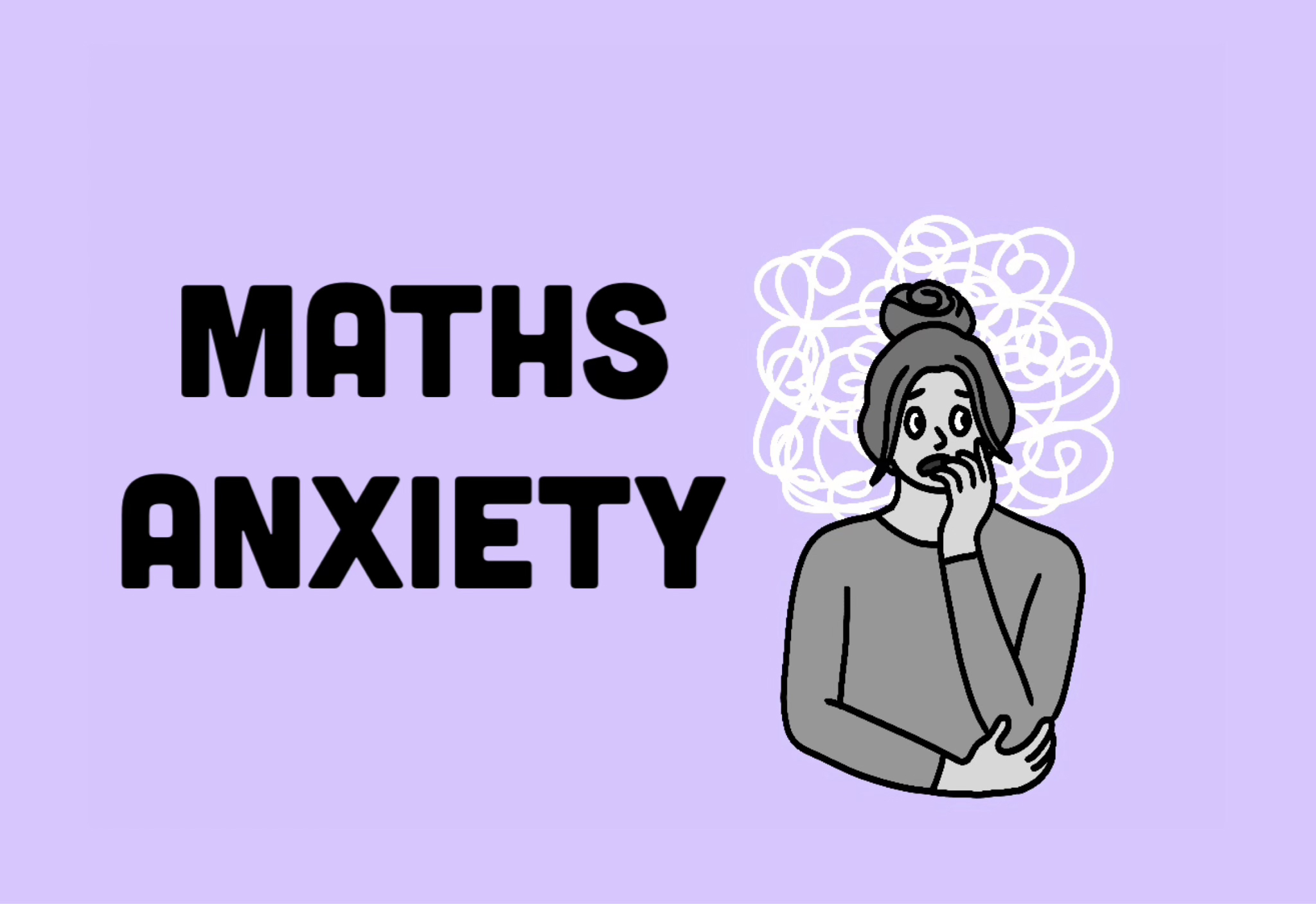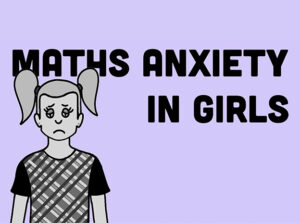WhatsApp:
+353 87 202 0389
Last week, I spoke to a completely lost parent. Their child, once top of the class in Maths, had slipped right back and was now being suggested to do Ordinary Level Maths. And they were only entering into 2nd year.
It’s a very common worry that I hear. “They’ve just lost the bit of confidence in the last year” or “They missed a few topics in school and now they are completely lost”. Once the confidence goes in their mathematical ability, a thing called Maths Anxiety creeps in.
Maths anxiety is a real condition and is more common than you might believe. Here’s all you need to know about Maths Anxiety.
Causes Of Maths Anxiety
About 1 in 5 people suffer with Maths Anxiety. A lot of Maths Anxiety stems from the attitude shown towards Maths in society. Growing up, children learn so many things from their parents. So, it only makes sense that they can learn a negative view towards Maths.
When parents tell their kids things like, “It’s okay if you don’t get it, I was never good a Maths either”, it sends a loud message: Maths is not something everyone is good at. This causes students to doubt their Maths skills. It creates a mindset that they will never excel at Maths, no matter how hard they try. So, if they truly believe this, why would they try?
But kids aren’t only affected by the words of their parents. When students see that primary school teachers are less confident or interest in Maths, the students internalize it. If those who teach our students Maths don’t even like it themselves, how are our students ever going to?
In addition to this, society as a whole has a big impact on Maths Anxiety, especially for girls. There have been subtle messages for years that affect girls’ confidence when it comes to Maths. Ireland still had a “for girls only” Maths exam up until 1968, based on arithmetic for household chores and cooking. Even today, there are clothes for young girls with statements like “too pretty for Maths”. Why does society try to tell girls that they aren’t supposed to be good at Maths? That they only need to know Maths for domestic chores, or that they can either be pretty or smart, but not both. Of course messages like these are causing young girls to have Maths Anxiety. When the world tells you over and over again that you will always struggle with Maths, you will eventually accept it as fact.
Is It Genetic?
Many students are under the impression that you’re either good at Maths or bad at Maths. That Maths skills are somehow an ability you can be born with.
It’s true that some people are inclined to enjoy Maths more than others. But, it doesn’t mean that people are either born good or bad at Maths. It’s just like other hobbies. Some people gravitate more towards reading, or painting, or music. But this natural born interest doesn’t mean that only certain people can read, paint, or play music. Anyone can learn and excel at these skills if they are taught them—just like Maths!
Carol Dweck, a Stanford University psychologist, says that people have one of two mindsets: fixed or growth. Students with the fixed mindset believe there’s a limit to their intellectual abilities. If they can’t easily grasp certain topics, it must be because of a natural lack of skill that. Something that can’t be changed. However, the growth mindset says otherwise. It encourages students to always work to improve their intellectual capabilities. Students with this perspective believe that intellect is due to hard work and practice. Not genetics.
Many experts believe that the growth mindset is the key to succeeding at Maths. Students who believe they are capable of understanding Maths have more confidence. This has been proven in many research papers by Dweck. She has demonstrated that the growth mindset develops perseverance skills. This allows students to do better academically in the long term.
How Maths Is Taught
Maths is poorly taught in Irish schools and it’s another big reason for Maths Anxiety. There’s large class sizes, a lack of qualified teachers, and insufficient enthusiasm. With these negative factors, it’s no wonder Maths Anxiety exists.
Classes in Ireland are too big to effectively teach students. Compared to other countries in the OECD, Irelands class sizes remain one of the highest. In fact, in 2016 Ireland’s classes were the largest in the EU according to the OECD report. During the period of this report, Ireland’s average class size was 24. That’s a lot compared to the EU average of 20, and the OECD average of 21. The ideal class size would be similar to other countries like Estonia, Finland, and Poland. Their classes averaging less than 20 students per class.
But how does class size negatively affect students’ educations? The OECD report found a definite negative correlation between larger classes and academic performance. Larger classes make it difficult for teachers to do their job effectively. It’s hard to enforce behavioral expectations, monitor students, and give students individual attention. There’s more disorder and less opportunities to help struggling students.
Additionally, the current Dublin cost-of-living crisis is only making the situation worse. There is a mass exodus of young, talented teachers who can’t afford housing with their salary. Many quit their Dublin teaching jobs for different opportunities. Some move to jobs outside of Dublin. Others teach abroad in countries like Canada, Australia, or the Middle East. And some teachers even quit the profession altogether for a better paying career.
This decrease in educators is forcing unqualified teachers to step up. A poll by the ASTI found that “81% of principals surveyed had to resort to hiring ‘unqualified teachers’ as a result of being unable to fill positions.” As well, many have had to cover extra classes that they normally don’t specialize in, due to the lack of teachers. This leads to unenthusiastic teachers that aren’t confident in the subjects. And when a teacher isn’t confidence in Maths, the student won’t be either.
In an Irish Examiner article, James McGrath talked about one of his unenthusiastic teachers. His Honours Maths Teacher came in everyday, read the news paper, and told the students to “get on with their work”. In environments like that, most student will be lost and completely uninterested when it comes to Maths.
Maths Is Unique
Aside from all the outward influences causing Maths Anxiety, Maths plays a role as well. Maths is unique compared to other subjects. Early on, Maths is generally very binary. Answers are either right or wrong. There’s no room in between to award a student for their efforts to a wrong solution. This makes Maths discouraging to students who try their hardest with no positive feedback.
As well, Maths is cumulative. When a student falls behind in one Maths topic, it affects the rest of their learning. Students can’t just skip multiplication and then expect to succeed at Algebra later. Maths topics are all related. Unlike most other subject, like history. If you don’t learn everything about the Egyptians, you can still learn about the French Revolution.
These factors make Maths frustrating. When students don’t see progress for their hard work, it’s discouraging. It’s causing them to give up and fall behind, making the subject even harder in the long run. It’s a vicious cycle.
Solutions To Maths Anxiety
So, how do we fix this outbreak of Maths Anxiety?
One solution is to change up how we teach Maths. A new curriculum is now being put in place in Primary Schools. The first change in almost 25 years! This new way of teaching uses play and problem-solving. It goal is to make Maths more fun and relatable for children. It will allow children to be creative and take-risks. It also relates Maths to other subjects they’re learning and real life scenarios. It enforces celebrating children’s efforts and successes, while normalising struggles and mistakes. This new way of teaching Maths should have positive impacts on the way students see and understand the subject.
Another solution is societal encouragement. We should speak positively about Maths, especially around impressionable minds. It shouldn’t be a norm to openly and proudly dislike Maths. This creates an idea that Maths is only for elite and intelligent people. Not for everyone.
Instead, we should encourage getting extra help when a child is struggling with Maths. Brushing it off and blaming their lack of skills on genetics causes confidence issues. Show students how to use their resources to find the solutions to tough problems.
Math is cumulative. So, if students successfully learn one topic, they will have established a foundation. This makes it easier to learn future topics. Maths is more enjoyable when students see progress and understand topics. When it’s more enjoyable, they will naturally want to do it more. And more practice will make them better at Maths overall. Thus, lessening their Maths Anxiety, and replacing it with Maths Confidence!
Conclusion
Maths causes a lot of students stress, but it doesn’t have to be that way. Children are very easily influenced by the views discussed around them. So, when a student is told Maths is hard, they will accept that and not try to be better at it.
It’s important that, as a society, we give students confidence when it comes to their education. When students believe it is possible for them to succeed, they are going to try harder to make that happen. If they think success is impossible, they will give up on trying. So, let’s start fixing the Maths Anxiety that so many students have. Let’s show them that everyone is capable of understanding and excelling at Maths.
– T.J – CEO of Breakthrough Maths
Need help in Maths? Contact the Breakthrough Maths team here.





